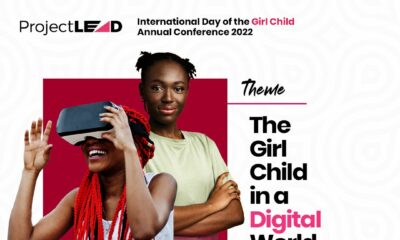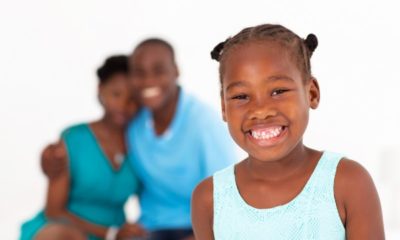Features
Tosin Nguher: International Day for the Girl Child 2014
 Today marks the second year of the commemoration of the International Day for the Girl-Child. Unfortunately, not many people are aware of this day or its significance; not many women; not many adolescent girls; and certainly not many little girls. On 19th December 2011, the UN General Assembly passed a resolution declaring 11th October the International Day for the Girl-Child. This day was commemorated for the first time the following year, on 11th October 2012.
Today marks the second year of the commemoration of the International Day for the Girl-Child. Unfortunately, not many people are aware of this day or its significance; not many women; not many adolescent girls; and certainly not many little girls. On 19th December 2011, the UN General Assembly passed a resolution declaring 11th October the International Day for the Girl-Child. This day was commemorated for the first time the following year, on 11th October 2012.
I love being a woman, I loved that I was once a girl child and an adolescent girl many years ago. I grew up in a happy home with 4 girls and a boy. Throughout my childhood and even up till the time I became an adult, I don’t remember that my parents gave preferential treatment to my brother because he was a boy. As far as my parents were concerned, we were all equal- we attended the same schools, ate the same food, did our chores in equal measures, and it goes on. The only difference was in the clothes we wore, of course his had to be what boys wore and ours, what girls wore. I never grew up knowing about discrimination on the basis of sex, as we were all told that we all had equal measures of what it took to succeed in life and given equal opportunities in all things. I never understood it when some of my friends assumed that my brother was luckier than the rest of us because they thought he would get or was getting preferential treatment because he was a boy. I always calmly told them that he was treated just like the rest of us girls and not in any special way, most of them doubted me but I did not care.
My parents, as husband and wife, related to each other as friends, partners and a lot of times my dad (God continue to rest his soul) sought the opinion of my mum in making decisions and indeed the opinion of us as children when the need arose. I still remember when my youngest sister was born many years ago, when I was just five or six, my dad called a “family meeting”; the agenda of that meeting was for us to all make suggestions on what name we should give our newborn baby sister. Everyone started making their suggestions; from the good, to the bad and to the ridiculous, we all spilled out our thoughts on what we thought were appropriate names for our baby sister. My dad who was the chairman of the meeting vested with veto power promptly vetoed most suggestions. I mean, why would a child who is born into a Yoruba home, be called “Nkechi” as suggested by my sister? So I thought and thought and finally, I blurted out “Bunmi”, only God knows how that name came to me (I call it destiny), but I said it and viola! That name won. So my sister was named “Olubunmi”, which means, “God gave me”, Bunmi for short. This was the kind of “democracy” that obtained in the home I grew up in.
Fast forward to many years later, I became a lawyer and went further to specializing in human rights law, and then my eyes opened to a new world of inequalities relating to the female gender. I started hearing about discrimination on the basis of sex. For a very long time, I could not relate to stories I heard, because I did not grow up in an environment where girls were regarded as lower than boys. I got to know about the mind-boggling statistics on girls; so many girls are uneducated because of their sex, that is, just because they are girls. In some homes with boys and girls, the boys were sent to school and the girls were expected to stay at home because they were simply girls. A recent UNESCO statistic state that nearly 1 in 5 adolescent girls around the world are out of school, that means 65 million girls worldwide are not in school and may never get educated. A girl that is not educated is more likely to be married off early, trafficked and physically and sexually abused, than a girl who is educated. Child marriage resulting in early and unwanted pregnancies poses life-threatening risks for adolescent girls. Worldwide, pregnancy-related complications are the leading cause of death for 15-19-year-old girls.
Reported cases of physical and sexual violence abound in our country and all over the world; however, unreported cases are even more heartbreaking. According to UNICEF, around 7 in 10 girls aged 15-19 who experience physical or sexual abuses never seek help. A lot of them are too scared to talk about it to anyone, sometimes, when they talk, they get into more trouble than they are in already, some even lose their lives because they talked. Now these are all very heart wrenching statistics, which shows the disadvantaged position a lot of girls find themselves in.
This is even worse especially when we think about the fact that presently, some groups are totally averse to education of the girl-child, adding to the already unfavourable situation which girls find themselves in, in their immediate environment. Case in point is the Boko Haram in Nigeria and the Taliban in Pakistan, Afghanistan and some other countries in the Middle East. Two years ago, Malala Yousafzai a 14 year old girl from Pakistan, because of her belief in the education of the girl-child, got shot on the head by the Taliban, on her way from school. Thankfully, she is very much alive today; this young girl has kept the fire burning in her worldwide advocacy for the education of girls and her story is poignant in the fight to ensure that girls receive education. I am sure the Taliban must be kicking themselves for bringing her to worldwide acclaim and popularity by their action of trying to take her life. This is especially so, as she has just won the most prestigious Nobel Peace prize, making her the youngest person alive to be given this award. This is a story that has ended well.
However, another story on this side of the world is yet to end well; on the night of April 14-15 this year, the Boko Haram, in Chibok, Borno state, abducted 276 Nigerian girls from their school while they were getting educated. A few of them were able to escape, but up till date almost 200 of these girls are yet to be rescued from their captors. It is unimaginable, the kind of pain these girls would be going through where they are and even worse is the emotional torture their families would be going through up till now. Its been 6 months since the abduction and as a nation we keep wondering what our government is doing and pray for the safe return of these girls.
We may ask, what next? Where do we go from here? How can we make a difference? We make a difference by rejecting and speaking up against all forms of discrimination against girls. Just like me, there are some lucky few who have the education and grew up in an environment of equality. However, there are very many girls who are not that lucky; a life of discrimination and abuse is the only life that they know and believe exists for them. We all have to stand up for the rights of our sisters and for the education of the girl-child. We should speak out against all forms of abuse be it physical or sexual. We should also speak out against child trafficking and child labour. When that girl, be it your sister, niece, neighbour, child, or even another person’s child, comes to you to tell her story of abuse, do not turn her away or cause her more trauma through your disbelief or desire to hide her story to protect yourself or the perpetrator. Speak out for her and help her out. When we begin to speak out, only then would we end the cycle of violence against the girl-child.
Photo Credit: Dreamstime | Karelnoppe
























